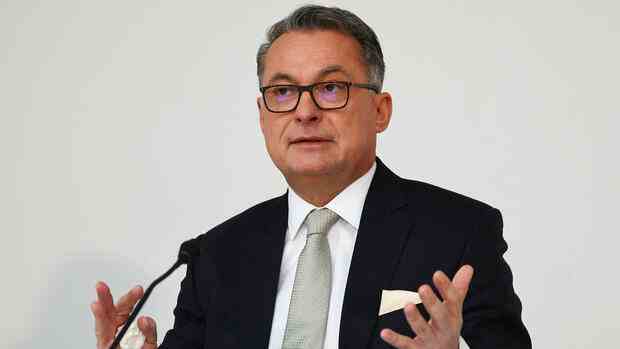Germany’s top central banker is seen as a supporter of a strict monetary policy.
(Photo: Reuters)
Frankfurt Despite the fears of a new financial crisis, Bundesbank chief Joachim Nagel is in favor of further increases in interest rates in the euro zone. “Our fight against inflation is not over yet,” he told the Financial Times. ECB President Christine Lagarde said on Wednesday that higher interest rates were gradually starting to have an effect. They do not see any risk of contagion for Europe’s banking sector.
He still has the impression that “price pressures are strong and broad-based throughout the economy,” Nagel said. Referring to the level of interest rates, he said: “There is still a long way to go, but we are approaching the restrictive area.” after she stopped her raises.
At the conference “The ECB and its Watchers” in Frankfurt, Lagarde reiterated that the ECB’s monetary policy is working robustly in a restrictive direction. “And this process is now slowly beginning to take effect.” However, inflation is still high and uncertainty about its further development has increased further. “Consequently, a solid strategy is essential for the future.”
The French also announced further increases. “We will ensure price stability and bringing inflation back to 2% in the medium term is non-negotiable,” she said.
At the same time, Lagarde made it clear that the currency watchdogs will be guided by the economic data. “First and foremost, this means that we are not locked into raising rates any further, nor are we at the end of the hike cycle.”
If the baseline scenario of the latest ECB projections is confirmed, there is still work to be done to ensure that the central bank has removed inflationary pressures. The ECB presented new forecasts last week. She expects average inflation of 5.3 percent for 2023 and 2.9 percent for 2024. The central bank is more pessimistic with regard to the much-noticed core inflation.
The ECB raised its key interest rate for the sixth time in a row last week, from 3.0 to 3.5 percent. This makes loans for investments more expensive, which can dampen demand and slow down inflation – but also the economy.
Inflation remains stubbornly high. In February, consumer prices rose by 8.5 percent compared to the same month last year. The ECB is aiming for an inflation rate of two percent in the medium term, but according to its own estimates it will miss this target for a long time.
With a view to the current turbulence in the banking sector, Bundesbank boss Nagel stated that he currently sees no risk of the “resilient” banking system in the euro zone being infected. “We are not facing a repeat of the 2008 financial crisis,” said Nagel. “We can handle this.”
The head of the German central bank did not rule out that European banks would now become more cautious in lending after the turbulence surrounding the ailing Credit Suisse and the bankruptcy of the Silicon Valley Bank. However, he does not currently fear a credit crunch. It is “too early” to come to this conclusion. A credit crunch is defined as insufficient lending to the real economy, which can severely affect the economy.
Lagarde also reiterated that institutions in the euro zone are resilient and robust. She also said that given the current market tensions, the ECB stands ready to provide liquidity support to the financial system if necessary and to maintain the smooth transmission of monetary policy. She repeated what she said the previous week.
ECB chief economist Philip Lane now also believes it is unlikely that the latest banking turmoil will escalate into a major crisis. “We’re always running scenarios of what happens when we get accelerating effects, or things that reinforce each other,” he said at the conference. From the current point of view, however, this is unlikely.
More: Markets anticipate the end of the series of interest rate hikes – What the ECB has decided and how the reactions will be



